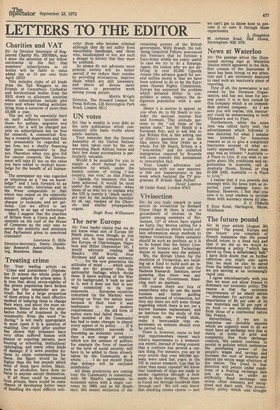Treating crime
Sir: Your leading article on 'Crime and punishment' (September 2) misses the whole point of the case against the prison mess. It Is true that about seven-eighths of the prison population have broken the law (the remainder are untried). But for a large proportion of them prison is the least effective method of inducing them to change their Ways, and about the most expensive. Hence the drive for alternative forms of treatment in the community. Even the word " inducing" is not really appropriate: in most cases it is a question of enabling. One study after another has shown that prisoners have ,very often suffered homes with absent or rejecting parents, poor housing or schooling, institutional Upbringing, and many other kinds Of damage: if it were possible for them to claim compensation for these, the figure would be far higher than the few pounds which Most of them have stolen. Many, such as alcoholics, have done no harm to anyone except themselves.
If all these could be removed from prisons, there would be some chance of developing better ways of handling the most difficult min
ority: those who become criminal although they do not suffer from identifiable handicaps, and those who, handicapped or not, are such a danger to society that they must be confined.
So please do not advocate more prisons: society will be better served if we reduce their number by providing alternatives, improve those which are still necessary, and above all devote more resources to preventive work among young people.
Martin Wright Director, The Howard League for Penal Reform, 125 Kennington Park Road, London SE1 1


































 Previous page
Previous page